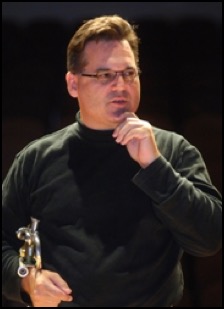July 2014
Concert schedule - Fall 2014
05/07/14 Filed in: Performance schedule
September 28, 2:00: Jacobsen Recital Series performing the Concerto for Trumpet and Bassoon by Paul Hindemith.
October 10, 11, 12, 7:30, 7:30, 2:00: Northwest Sinfonietta performing works by Vorisek, Dvorak, Bartok and Sarasate.
October 19, 2:30: Brass Band Northwest performs Heroes of England with music by Holst, Sparke, Vaughn-Williams and Vinter.
October 25, 7:30: Tacoma Symphony Orchestra performing with Evelyn Glennie including works by Respighi and Ravel.
October 26, 2:00: Jacobsen Recital Series with Mark Rojak, bass trombone.
November 2, 3:00: Lake Washington Symphony Orchestra, the Planets by Holst.
November 14, 15, 16, 7:30, 7:30, 2:00: Northwest Sinfonietta performing works by Gluck, Jones, Mozart and Youtz.
November 28, 29: Pacific Northwest Ballet, Nutcracker
Decemer 4: Edmonds Community College Choir, Rutter Gloria
December 7, 2:30: Tacoma Symphony performing Sounds of the Season.
December 9, 7:30: Brass Band Northwest performing All I Want for Christmas with guests PepperJill and Jack.
December 12, noon: Pacific Northwest Ballet, Nutcracker.
December 18, 19: Tacoma Symphony performs Messiah, Chapel Hill, Gig harbor then, St Charles Borromeo
December 13, 14, 20, 21, 23, 3:00pm: Tacoma Symphony/Tacoma City Ballet, Nutcracker.
December 26: Pacific Northwest Ballet, Nutcracker.
October 10, 11, 12, 7:30, 7:30, 2:00: Northwest Sinfonietta performing works by Vorisek, Dvorak, Bartok and Sarasate.
October 19, 2:30: Brass Band Northwest performs Heroes of England with music by Holst, Sparke, Vaughn-Williams and Vinter.
October 25, 7:30: Tacoma Symphony Orchestra performing with Evelyn Glennie including works by Respighi and Ravel.
October 26, 2:00: Jacobsen Recital Series with Mark Rojak, bass trombone.
November 2, 3:00: Lake Washington Symphony Orchestra, the Planets by Holst.
November 14, 15, 16, 7:30, 7:30, 2:00: Northwest Sinfonietta performing works by Gluck, Jones, Mozart and Youtz.
November 28, 29: Pacific Northwest Ballet, Nutcracker
Decemer 4: Edmonds Community College Choir, Rutter Gloria
December 7, 2:30: Tacoma Symphony performing Sounds of the Season.
December 9, 7:30: Brass Band Northwest performing All I Want for Christmas with guests PepperJill and Jack.
December 12, noon: Pacific Northwest Ballet, Nutcracker.
December 18, 19: Tacoma Symphony performs Messiah, Chapel Hill, Gig harbor then, St Charles Borromeo
December 13, 14, 20, 21, 23, 3:00pm: Tacoma Symphony/Tacoma City Ballet, Nutcracker.
December 26: Pacific Northwest Ballet, Nutcracker.
Philip Smith retires
05/07/14 Filed in: News

Philip Smith, principal trumpet of the New York Philharmonic, is retiring. He led that trumpet section for 36 years and produced a CD of excerpts that has become the de facto standard for orchestral trumpet playing. After the retirement of Bud Herseth, Phil Smith must be viewed as the leader of orchestral trumpet playing in America. He is notable enough that his departure was the subject of an article in The New Yorker:
Philip Smith, master trumpeter
The article and his comrades appropriately praise his career, but what I find telling is the one quote from Mr Smith, a master trumpeter who still, apparently, battles nerves:
A thirty-six-year career in the same orchestra means that expectations can remain high over a lifetime. “People keep showing up, and they want Mahler’s Fifth in 2013 to sound as good as it did in 1978,” he said. “And you’re going, ‘Shoot, man, I’m not sure if I can do that.’ So you have to watch the little voices and try to shove them out of the way. Try not to get focussed on mistakes. It’s like watching the Olympics—how many times you know these people are tops of their field, they get to the Olympics and the voices win. So it’s a constant battle to say, ‘Don’t let the voices win.’ Sing, sing, sing, sing, sing. When the voices start going, start singing.”
